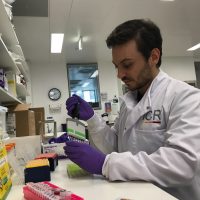Shining a spotlight on research for Bowel Cancer Awareness Month
Early diagnosis of dysplasia/cancer in IBD patients using a novel non-invasive test.
This collaborative project between St Mark’s and the Institute of Cancer Research aims to develop a blood test to spot early signs of cancer in people with Inflammatory Bowel Disease (IBD). Using the test could help target endoscopy to only those people who need it most.
The project is in an early stage, but there have been important and exciting findings to date, for example, the research team has seen a signature in the blood that, to a large extent, mirrors what is seen in endoscopic tissue samples (biopsies).
With the support of 40tude curing colon cancer and Bowel Research UK , this research will continue to develop significantly. The team hope that the research can lead quite rapidly to a non-invasive test for early cancer detection that will benefit people with IBD around the world. We are in a strong position to achieve this, for example because St Mark’s has one of the largest cohorts of IBD patients in the world, and we have strong national and international collaborative links with IBD colleagues which gives us access to thousands more IBD patients under endoscopic surveillance.
Professor Trevor Graham, Director of the Centre for Evolution and Cancer at the Institute of Cancer Research, said “Our initial findings suggest we can see the early signs of cancer development by looking at DNA in the blood. There’s a long way to go, but we hope that our research will eventually reduce the need for people with IBD to have endoscopy.”
 Kane, is a PhD student in Professor Graham’s group at the ICR. Funded by Bowel Research UK, and also supported by funding from 40tude Curing Colon Cancer, Kane is working in collaboration with Professor Ailsa Hart and her team at St Mark’s to research the development of the early detection blood test.
Kane, is a PhD student in Professor Graham’s group at the ICR. Funded by Bowel Research UK, and also supported by funding from 40tude Curing Colon Cancer, Kane is working in collaboration with Professor Ailsa Hart and her team at St Mark’s to research the development of the early detection blood test.
